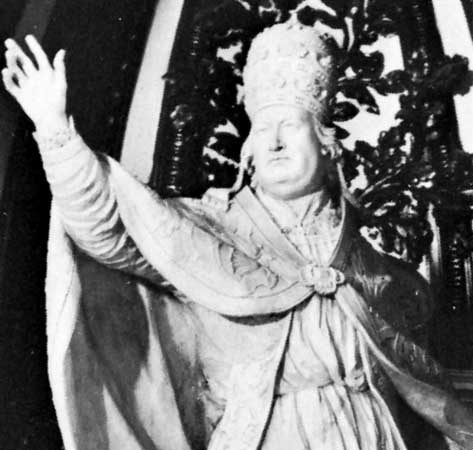Benedict XIV
pope
original name Prospero Lambertini
born March 31, 1675, Bologna, Papal States
died May 3, 1758, Rome
 pope from 1740 to 1758; his intelligence and moderation won praise even among deprecators of the Roman Church at a time when it was beset by criticism from the philosophers of the Enlightenment and its prerogatives were being challenged by absolutist monarchs. Typical of his pontificate were his promotion of scientific learning and his admonition to those in charge of drawing up the Index Librorum Prohibitorum (Index of Forbidden Books) to act with restraint.
pope from 1740 to 1758; his intelligence and moderation won praise even among deprecators of the Roman Church at a time when it was beset by criticism from the philosophers of the Enlightenment and its prerogatives were being challenged by absolutist monarchs. Typical of his pontificate were his promotion of scientific learning and his admonition to those in charge of drawing up the Index Librorum Prohibitorum (Index of Forbidden Books) to act with restraint.Of a noble family, he received a doctorate in theology and law from the University of Rome. In 1728 he was created a cardinal, and in 1731 he was made archbishop of Bologna by Pope Clement XII, whom on Aug. 17, 1740, he was elected to succeed.
In the Papal States he reduced the burden of taxation, encouraged agriculture, and supported a policy of free trade. He was conciliatory in his relations with the secular powers, making vast concessions to the kings of Spain, Portugal, Sardinia, and Naples in matters of patronage, the right of nomination to vacant sees, and secular jurisdiction over ecclesiastical changes. In his bulls Ex quo singulari (1742) and Omnium sollicitudinum (1744), he prohibited certain traditional practices that the Jesuits had allowed converts to retain in China and India. This ban set back the winning of converts in Asia and was partially reversed in 1939, when the church allowed acts of ancestor veneration, provided they were without religious significance. In 1756 he condemned the practice of refusing last rites to French ecclesiastics who still opposed the bull Unigenitus, directed against certain propositions of Jansenism, a Roman Catholic movement of unorthodox tendencies that had begun in 17th-century France.
Benedict was an active scholar all his life, founding several learned societies and laying the groundwork for the present Vatican Museum. A lively wit, he corresponded with many of the great men of his age, including Voltaire, who dedicated his tragedy Mahomet to him.
- Nevşehir
- New Age movement
- New Albany
- New Amsterdam
- New Apostolic Church
- Newar
- Newark
- Newark and Sherwood
- Newark-on-Trent
- New Bedford
- New Bedford in Moby Dick
- Newberg
- New Bern
- Newberry
- Newbery Medal
- Newbolt, Sir Henry (John)
- New Braunfels
- New Britain
- New Brunswick
- New Brunswick, flag of
- New Brutalism
- Newburgh
- Newburn
- Newburn, Battle of
- Newbury